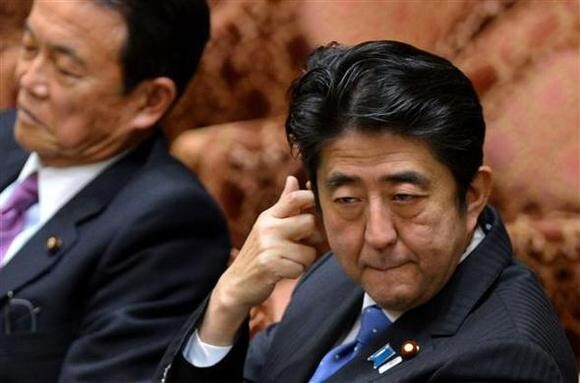hankyoreh
Links to other country sites 다른 나라 사이트 링크
Abe still denying Japan’s acts of aggression

By Jeong Nam-ku, Tokyo correspondent
Japan has faced criticism not only from South Korea and China, but also from the US over its attempts to adjust its position on historical issues. But even as Tokyo moves into damage control mode to handle the resultant backlash, Japanese Prime Minister Shinzo Abe has once again shown his deep-seated desire to deny the appropriateness of the term “act of aggression.”
According to a May 9 Asahi Shimbun report, Abe cited verbatim the apology portion of the Murayama Statement of 1995 during a May 8 meeting of the Upper House budget committee. “This government shares the view of past governments that Japan brought great loss and pain to the people of other Asian countries in the past,” Abe said. However, he hesitated to admit the fact that this was caused by Japanese acts of aggression.
“Various issues are being discussed in academic circles, and as a politician, I am not in a position to get involved there,” Abe said, initially maintaining a prudent attitude. However, as the questions continued, his true feelings soon became apparent.
On the question of whether the UN Security Council has the authority to determine acts of aggression, Abe said, “It’s not like they can go back in time and figure these things out. These are political decisions.” He added that there is no clear definition for the term “aggression” in academic circles.
The Asahi Shimbun also quoted a government official who said that Abe had prepared and brought with him a document to be used to answer the members of the Upper House. The material in the document stated that the Japanese government is not denying the acts of aggression, but Abe did not refer to the document at all during the meeting, the paper reported.
While Abe has said that he agrees with the section of the Murayama Statement that apologizes for the pain that Japan has inflicted on countries in the region, he has also shown signs of reluctance to accept the fact that this pain was caused by Japanese acts of aggression. This sheds some light on what kind of historical consciousness may be included in the “Abe Statement,” which the prime minister has indicated he will release in 2015 to replace the Murayama Statement.
In regard to the issue of offering reparations for Koreans who were forcibly mobilized, Abe said, “We signed an agreement that provided a complete and final solution to this issue. I view the problems of the past as belonging to the past and I want to take a new step forward. That is the history of humanity.”
Please direct questions or comments to [english@hani.co.kr]

Editorial・opinion
![[Editorial] Does Yoon think the Korean public is wrong? [Editorial] Does Yoon think the Korean public is wrong?](https://flexible.img.hani.co.kr/flexible/normal/500/300/imgdb/original/2024/0417/8517133419684774.jpg) [Editorial] Does Yoon think the Korean public is wrong?
[Editorial] Does Yoon think the Korean public is wrong?![[Editorial] As it bolsters its alliance with US, Japan must be accountable for past [Editorial] As it bolsters its alliance with US, Japan must be accountable for past](https://flexible.img.hani.co.kr/flexible/normal/500/300/imgdb/original/2024/0417/6817133413968321.jpg) [Editorial] As it bolsters its alliance with US, Japan must be accountable for past
[Editorial] As it bolsters its alliance with US, Japan must be accountable for past- [Guest essay] Amending the Constitution is Yoon’s key to leaving office in public’s good graces
- [Editorial] 10 years on, lessons of Sewol tragedy must never be forgotten
- [Column] A death blow to Korea’s prosecutor politics
- [Correspondent’s column] The US and the end of Japanese pacifism
- [Guest essay] How Korea turned its trainee doctors into monsters
- [Guest essay] As someone who helped forge Seoul-Moscow ties, their status today troubles me
- [Editorial] Koreans sent a loud and clear message to Yoon
- [Column] In Korea’s midterm elections, it’s time for accountability
Most viewed articles
- 1Samsung barricades office as unionized workers strike for better conditions
- 2[Column] The clock is ticking for Korea’s first lady
- 3[Editorial] When the choice is kids or career, Korea will never overcome birth rate woes
- 4S. Korea, Japan reaffirm commitment to strengthening trilateral ties with US
- 5[Editorial] As it bolsters its alliance with US, Japan must be accountable for past
- 6[Guest essay] How Korea turned its trainee doctors into monsters
- 7Japan officially says compensation of Korean forced laborers isn’t its responsibility
- 8[News analysis] After elections, prosecutorial reform will likely make legislative agenda
- 9[Editorial] Does Yoon think the Korean public is wrong?
- 10Strong dollar isn’t all that’s pushing won exchange rate into to 1,400 range